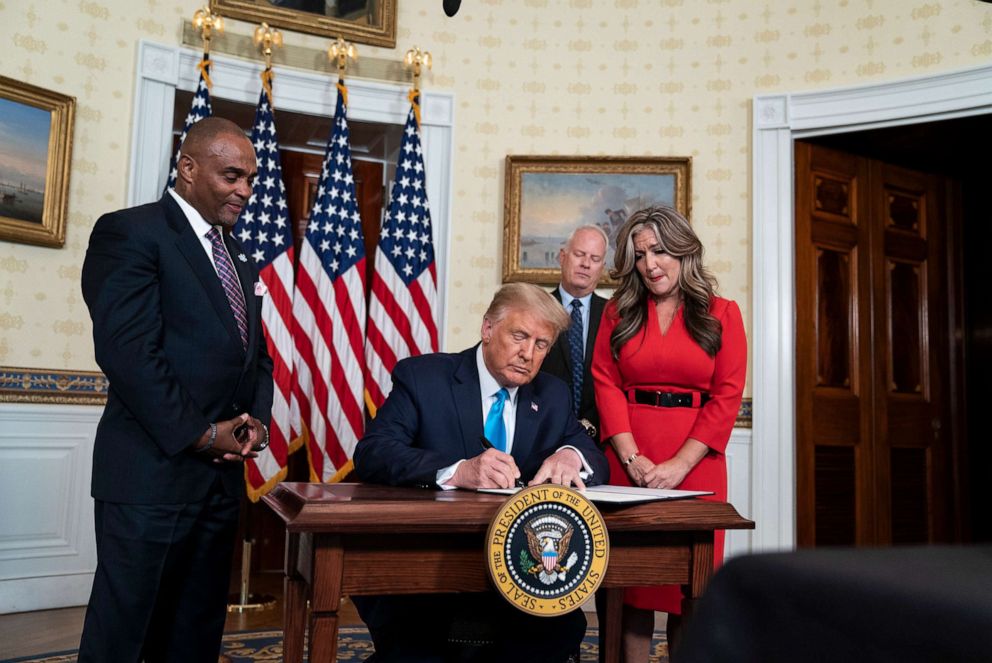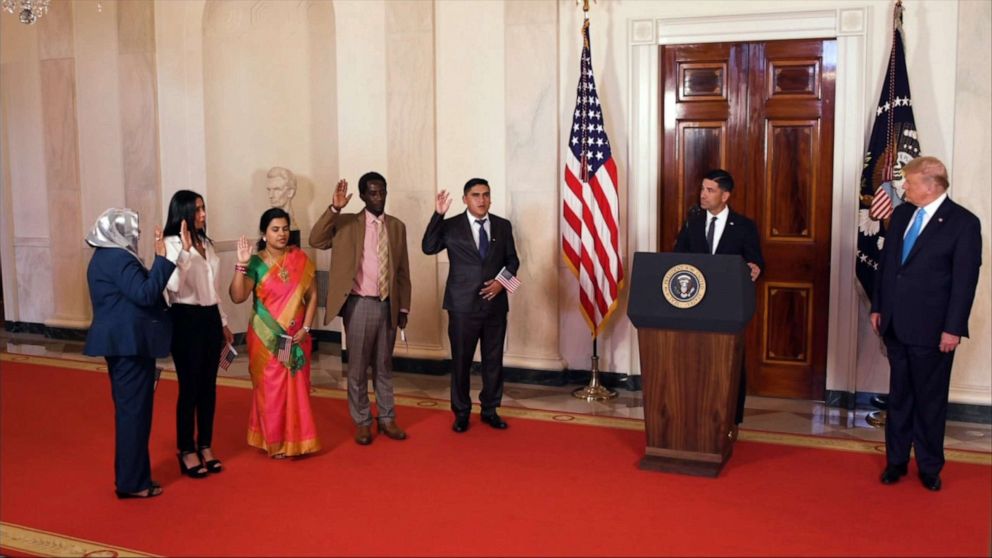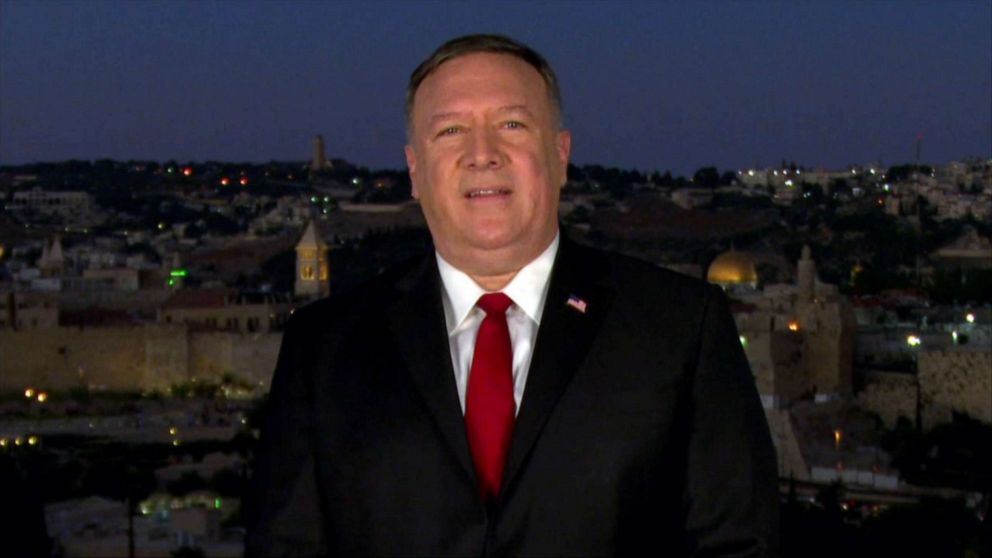What you should know about the 1939 law the RNC is accused of violating
The law bars federal employees from engaging in political activity.
The Republican National Convention is facing questions after administration officials performed official duties while promoting the reelection of President Donald Trump -- possibly violating the Hatch Act, a law that bars some government employees of engaging in political activity while acting in their official capacities.
The blending of official duties with campaign events has prompted several denunciations, including the opening of an investigation by House Democrats into whether Secretary of State Pompeo violated the Hatch Act while speaking at the RNC on an official overseas trip.

While the White House has dismissed any accusations of wrongdoing, it's not the first time a Trump Administration official has been found to have run afoul of the 1939 law.
The events have left many with questions as to what exactly the Hatch Act is, whether it conflicts with First Amendment rights to free speech, and why those close to the president are able to allegedly violate it with no apparent consequences.
What is the Hatch Act?
The Hatch Act was originally passed in 1939 following allegations that employees of a New Deal agency, the Works Progress Administration, had used their official positions to benefit the Democratic Party. The act sought to outlaw bribery and coercion of voters by public officials and placed restrictions on federal employees from engaging in certain political activities.
It has been significantly amended in the decades since, and has withstood several challenges in front of the Supreme Court regarding concerns it overly restricts employees' free speech rights.
Under the current version of the law, federal employees in the executive branch are prohibited from using their official positions "for the purpose of interfering with or affecting the result of an election," according to the OSC. In past decades, the Hatch Act has been in the headlines in cases where top officials in the Trump, Obama and Bush administrations have been found to have advocated for a particular party or candidate while acting or being identified by their official titles.
The law generally doesn't prohibit employees from acts such as placing campaign slogans or signage on their personal property or expressing their political opinions at work -- as long as that isn't done for the express purpose of engaging in campaign-related activity on behalf of a particular candidate or cause.
Federal employees deemed "further restricted employees" are held to different standards under the act, however, and generally face more stringent conditions regarding their abilities to engage in political activity like attending campaign events or conventions, or handing out fliers at polling places, for instance.

Can an employee be punished for violating the Hatch Act?
Yes. According to the Office of the Special Counsel, all civilian employees serving in the executive branch of government -- with the exception of the president and vice president, are subject to scrutiny under the Hatch Act.
Federal employees found in violation of the Hatch Act by the independent Merit Systems Protection Board can face punishment such as removal from federal service, a point reinforced in Special Counsel Henry Kerner's letter to Trump after White House counselor Kellyanne Conway was accused of violating the act in 2019.
"If Ms. Conway were any other federal employee, her multiple violations of the law would almost certainly result in removal from her federal position by the Merit Systems Protection Board," said Kerner, who previously served under former Republican Rep. Jason Chaffetz on the House Oversight Committee and was appointed to the position by Trump in 2017.
However, presidential appointees who are a part of the Executive Office of the President aren't subject to the same accountability as other executive branch employees and can't be punished or removed in the same fashion as the rest of the executive branch workforce.
In the case of close advisers to the president, as in Conway's case, or even Cabinet officials, the final determination on how to handle Hatch Act violations is left in the hands of the President.
President Barack Obama similarly didn't discipline his former HHS Secretary Kathleen Sebelius in 2012 when she was found in violation of the Hatch Act, or his HUD Secretary Julian Castro, who was found in violation of the Hatch Act for a 2016 interview in which he praised Hillary Clinton.
However, both of those officials released statements apologizing following the OSC's investigations -- while Conway has remained defiant and not apologized or even acknowledged her alleged violations, according to the OSC.
What are the Republicans accused of doing?
Republican National Convention programming on Tuesday featured two instances where Trump conducted official business inside the White House -- a naturalization ceremony for five new citizens as Wolf administered the Oath of Allegiance, and a video of Trump granting a pardon inside the White House.
While the president and vice president are exempt from the civil provisions of the Hatch Act, some experts say the law applies to executive branch employees who are involved in planning or executing any political events staged at the White House, including video segments filmed there.
Kathleen Clark, an ethics lawyer and professor at Washington University Law School in St Louis, told ABC News the Hatch Act the White House is a venue is significant because the act was written in such a way that it specifies prohibited activities as being limited to the confines of federal buildings.
“When Congress passed these provisions, they wanted to ensure that the federal workplace was free from partisan political activity and the language they used was referring to a room or building occupied by federal employees," she said.
Pompeo has also faced criticism for breaking a decades-old taboo and his own department policies by speaking at a political convention. No other sitting secretary of state had delivered a speech like his before their party's political convention.

In a letter this week to the deputy secretary of state, Rep. Joaquin Castro, D-Texas, chairman of the House Foreign Affairs Oversight and Investigations Subcommittee, cited the Hatch Act and State Department guidance that "senate-confirmed Presidential appointees may not even attend a political party convention or convention-related event."
What about First Amendment-protected free speech?
Many people have questioned over the years whether the Hatch Act puts a muzzle on what most Americans would consider First Amendment-protected speech.
But proponents of the law argue that it does a public service in separating the official functions of the U.S. government from the partisan battles seen in elections.
For instance, a majority opinion issued in a Supreme Court challenge to the Hatch Act in 1947 upheld the law on the basis that political activity could disrupt the very ability for government agencies to function, saying free speech had to be weighed against “the requirements of orderly administration of administrative personnel."
Separately, advocates argue that allowing federal employees to mix their official duties with political advocacy risks corruption, and officials being able to wield their government titles in a way that elevates their voice over the common citizen.
ABC News' Conor Finnegan, Shannon Crawford and Libby Cathey contributed to this report.




